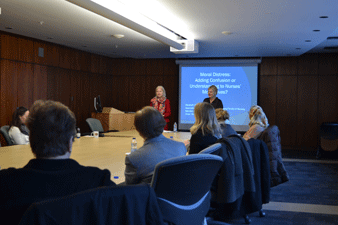On February 27, 2014, the first in the winter Alumni Roundtable series took place. The bitter cold of this February evening did not keep the attendees from an engaging conversation with Bloomberg Nursing Associate Professor Elizabeth Peter on “Moral Distress: Adding Confusion or Understanding to Nurses’s Moral Lives?” Peter focuses her work on ethical concerns in community nursing, with a special emphasis on home care. She has taught nursing ethics courses at U of T Nursing and is a recipient of a U of T Nursing Teaching Award for Excellence in Educational Leadership.
What is moral distress? The Canadian Nurses’ Association’s 2008 code of ethics defines moral distress as arising “in situations where nurses know or believe they know the right thing to do, but for various reasons (including fear or circumstances beyond their control) do not or cannot take the right action or prevent a particular harm. When values and commitments are compromised in this way, nurses’ identity and integrity as moral agents are affected and they feel moral distress.” While moral distress is arguably the most studied phenomenon in nursing ethics, it has also been described as conceptually confused and superficial. Peter argued that a close examination of moral distress can increase our understanding of the moral-social spaces of nurses, provided that sufficient philosophical depth is given to the concept.
Attendees from the class of 2013 all the way back to the class of 1961 joined together in a keen debate. Discussion surrounding moral distress in practise realities, in particular with regard to overly aggressive treatment and medical uncertainty, was of particular interest. “Sessions like these are important – they keep me connected to my academic home, are relevant to my daily work, and the opportunity to engage in collective scholarly discussion is meaningful and stimulating,” says Dr. Barbara Mildon, BScN (93), MN (98), PhD (2011) Events like the Alumni Roundtable Series are just one example of how Bloomberg Nursing continues delivering educational value to all of our students, past and present.
